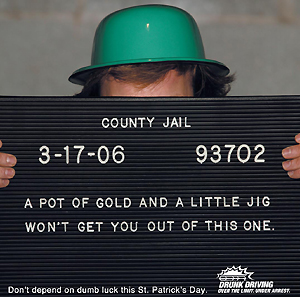
|
CONNECTIONS
|
IDAHO
ITD
HOME
IDAHO DMV
ITD
NEWS
HIGHWAY
SAFETY
IDAHO STATE
POLICE
TRAVEL SERVICES
STATE OF IDAHO
NATIONAL
AASHTO
AAMVA
AAA of IDAHO
FEDERAL HIGHWAYS
FEDERAL AVIATION
IDAHO STATE POLICE
NHTSA
NTSB
TRB
U.S. DOT
Idaho
Transportation
Department
Public Affairs Office
P.O. Box 7129
Boise, ID 83707
208.334.8005
Fax: 208.334.8563
Email

Driving 'buzzed' still is driving drunk
As St. Patrick's Day approaches March 17, the transportation department reminds motorists that "buzzed" driving is considered drunk driving, and law enforcement agencies throughout Idaho will be out in full force to catch and arrest impaired drivers.
 "St.
Patrick's Day has become a big night out for many Americans - especially
young adults," said Kevin Bechen with ITD's Office of Highway Operations
and Safety. "It has also become a dangerous night on our highways
due to impaired drivers.
"St.
Patrick's Day has become a big night out for many Americans - especially
young adults," said Kevin Bechen with ITD's Office of Highway Operations
and Safety. "It has also become a dangerous night on our highways
due to impaired drivers.
"This year, the risk may even be greater since many of the traditional festivities will take place on a Saturday night," Bechen said. "Unfortunately, too many people still don't understand that alcohol and driving don't mix."
In 2005, 36 percent of all traffic fatalities in Idaho
were a result of impaired driving. Wearing a seat belt is still the
best defense in a crash caused by a drunk driver - 70 percent of the
motor vehicle occupants killed by drunk drivers in 2005 were not buckled
up.
For a safer St. Patrick's Day, Bechen offered a few simple reminders:
-
Plan ahead. Whenever alcohol will be consumed, designate a sober driver before going out, and give that person the vehicle keys.
-
If impaired, call a taxi, a sober friend or family member to get home safely.
-
Use available sober rides programs.
-
Promptly report drunk drivers seen on the roadways to law enforcement.
"Driving any vehicle - including a motorcycle - when buzzed or drunk is simply wrong and not worth the risk," said Bechen. "Not only do you risk killing yourself or someone else, but the trauma and financial costs of a crash or an arrest for impaired driving are significant."
Violators face jail time, loss of their driver's license, higher insurance rates, attorney fees, unpaid time away from work and dozens of other expense, he said.
Published 3-9-07